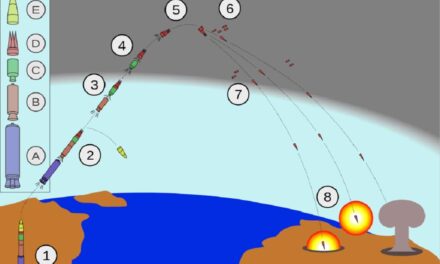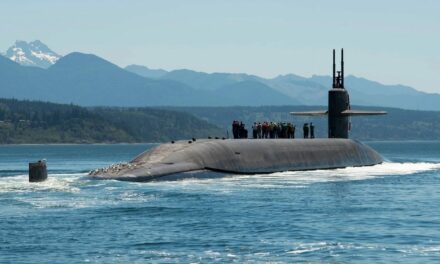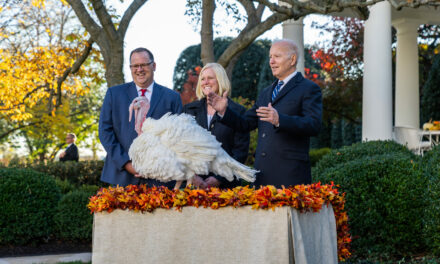We support our Publishers and Content Creators. You can view this story on their website by CLICKING HERE.
On 9/11, Sunni Islamism attacked the U.S. and suffered a crushing American response that allowed Iranian Shia Islamism to rise and dominate parts of the Middle East. On 10/7, Shia Islamism – with the hands of Sunni Hamas – attacked Israel and suffered a crushing Israeli response that leveled the field. Sunni Islamism thus rebounded, taking Syria from the Iran-led axis, and promising to establish a moderate and inclusive government. In these early hours, we have so far detected encouraging signs, and also some worrying ones.
Syria’s new rulers seem keen on avoiding the pitfalls that doomed change in other Arab countries. For a start, they asked incumbent prime minister Muhammad Ghazi al-Jalali and his cabinet to continue governing. Syrians seem to understand that the bureaucracy was not part of Bashar Assad’s notorious and brutal agencies. The cabinet can thus be useful during these turbulent times.
Syria’s new rulers also took over government buildings in an orderly manner. They did not break or burn government facilities – such as the state-owned TV – but rather rebranded them and used them to plead with Syrians not to loot state property.
The new rulers also declared a nightly curfew in Damascus, perhaps aware that security remains the cornerstone of any functioning state.
All these signs indicate that those who toppled Assad understand global fears, that the sudden disappearance of the ruling regime may lead to lawlessness. Whether they will manage to maintain security, stability, and basic government — in the short and medium term – remains to be seen.
All the signs above are encouraging. Less hopeful is the interview with the chief rebel, Ahmad Sharaa, formerly known as Abu-Muhammad al-Jolani, who debuted on the Syrian stage, many years ago, as an Al-Qaeda operative.
Since then, Qatar and its propaganda arms, first and foremost the influential satellite channel Al-Jazeera, have been hard at work trying to rebrand him as a moderate. Qatar sold the world a similar package about the new rulers of Afghanistan, a Taliban that had presumably matured and moderated. After the Taliban retook Afghanistan, and as time went by, the Taliban started chipping at personal freedoms, turning the country into a repressive, socially engineered, Islamist place.
No one is sure whether Sharaa has sincerely moderated or is just selling the world empty promises. President Biden said America will judge the new rulers of Syria based on their actions, moving forward, implying let bygones be bygones.
Su-25 fighter used in Russian actions in Syria. Image Credit: Creative Commons.
Sharaa gave CNN an interview in which he said all the right things. About his past with Al-Qaeda, he said he was young and inexperienced then. Whether Syria will become an Islamist emirate like Afghanistan, he said the Syrian society will live as it has done so for centuries – observing its long-held traditions. He did not say whether he will employ morality code or police to enforce these “traditions” as he understood them.
Still worrying was the Jihadist flag behind Sharaa, right next to the Syrian revolution flag. Also of concern was the CNN anchor donning on her head a loose hijab, as she interviewed him. Did she do so out of her own volition and in deference to the Islamist Sharaa or was she required to cover up, like Islamic Republic of Iran officials force CNN female interviews to do?
Finally, Sharaa and the new rulers of Syria have yet to say a word about Israel or the Palestinians. New rulers in Iraq and post-Arab Spring countries tip-toed around this issue in the early weeks and months, and eventually came out as antisemitic as antisemitism could get. Sharaa has avoided the Israel issue, a bit uncharacteristic of an Islamist personality. He also stirred clear of commenting on Syria’s future regional alignment or global position.
Anxiety over the future of Syria should not take away from the jubilance of Syrians, millions of whom will be returning to their country after years in exile in Europe and neighboring countries.
Will Syrians realize that, had it not been for Israel decimating the Iran-led axis, their victory over Assad would not have been possible? Will Syrians thank Israel for its effort, open a new page with the Jewish state, and sign a peace deal with their neighbor?
Perhaps it is still too early to ask such questions. But sooner or later, the joy of victory will wear off, and the world will be on the edge, waiting to see whether Syria becomes the exception and leads the region in a positive direction, or will just do more of the same: Engage in a bloody civil war until a tyrant emerges, this time most likely a populist Islamist.
About the Author:
Hussain Abdul-Hussain is a research fellow at the Foundation for the Defense of Democracies (FDD). Follow him on X @hahussain

 Conservative
Conservative  Search
Search Trending
Trending Current News
Current News 





